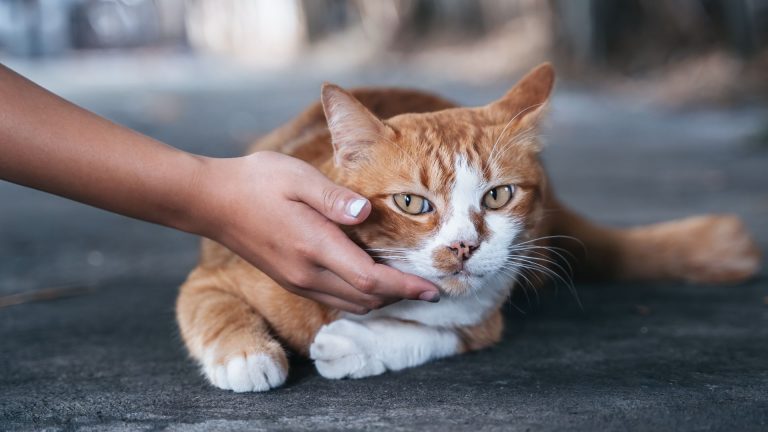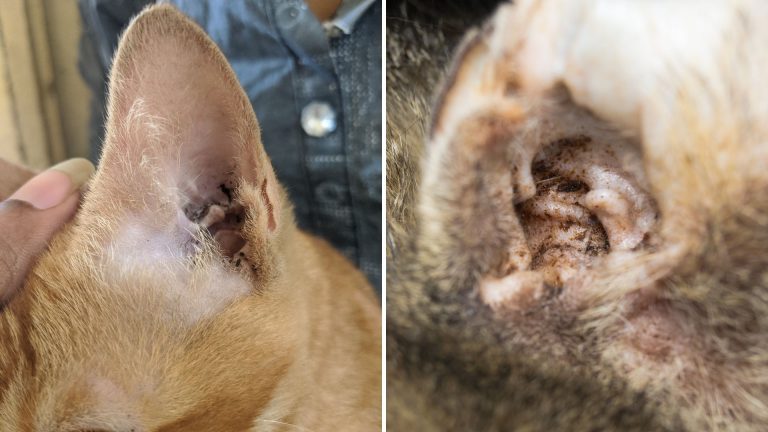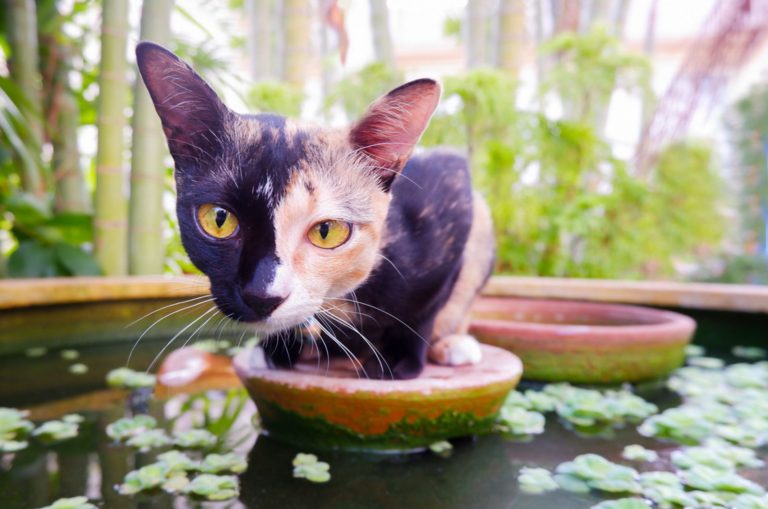Is Your Cat Peeing In Shoes? 12 Ways To Put An End To It
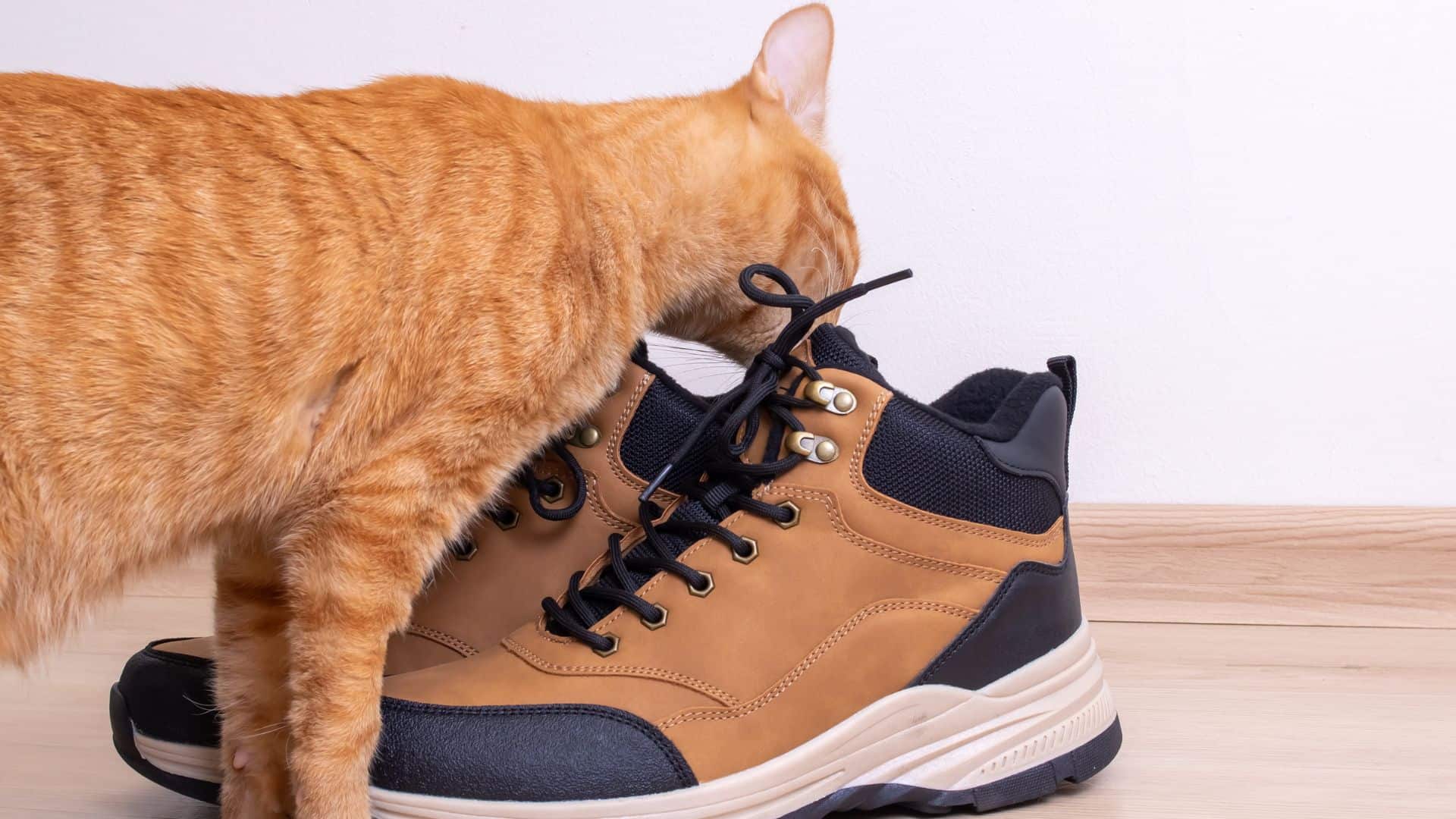
It’s a baffling mystery: why is my cat peeing in shoes? Cleaning your shoes and hoping your cat doesn’t do it again is simply not enough.
Pet owners, have you ever stopped to wonder why this behavior happens?
If you’ve experienced the frustration of finding that your furry friend has decided to use your favorite pair of shoes as a toilet, you will want to ensure your cat never does it again!
After reading this article, you’ll know exactly what to do! So with no further ado, let’s dig in.
Cat Peeing In Shoes
While cats may exhibit various odd behaviors considered normal, such as scratching, rubbing against objects, and marking their territory, urinating outside the litter box is generally regarded as atypical.
If your cat is peeing in your shoes, it may be due to a few different things, most notably:
• medical issues (such as a urinary tract infection or bladder infection)
• behavioral issues (such as excessive territory marking)
• or the cause can be rather simple (such as not having a clean litter box to use)
Let’s talk more about the possible reasons your cat is peeing in shoes! Later on, we will go over what you can do to stop this cat behavior, so make sure you stick around.
17 Potential Reasons Your Cat Is Peeing In Shoes
1. Your Cat Is Territory Marking
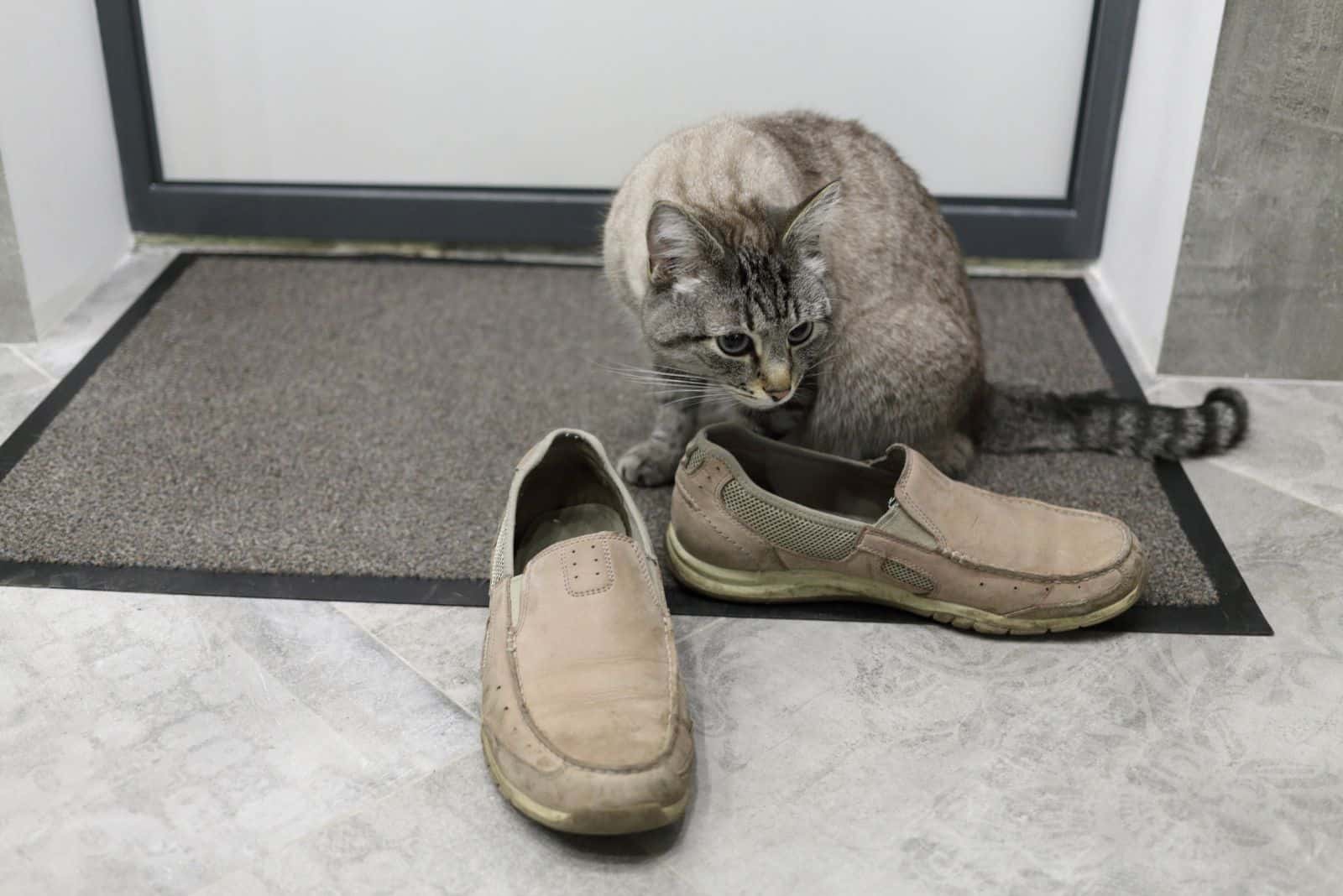
Cats may urinate in shoes as a way to mark their territory. Urine-marking behavior is more common in male cats but can also occur in female cats.
2. Your Cat Doesn’t Have Access To The Litter Box
Your cat may feel uncomfortable using the litter box if it is located in a high-traffic area. Or perhaps your cat’s litter box is on the upper floor, and your cat spends most of its time on the first floor (for example).
3. Your Cat’s Litter Box Is Dirty
If your cat’s litter box is not cleaned regularly (or if the litter is not changed often enough), your cat may avoid using it and instead choose to pee somewhere else, for example, in your shoes.
4. Your Cat Didn’t Get Enough Training On How To Use A Litter Box
If your cat was not adequately trained to use the litter box as a kitten, it might continue to exhibit poor litter box behavior as an adult. Perhaps your cat randomly decided to use shoes as a potty instead.
5. Your Cat Doesn’t Like Its Litter Box
Your cat may prefer a different type of litter or litter box and may express their preference (or dissatisfaction) by peeing outside the box.
6. Your Cat Might Be Experiencing Stress And Anxiety
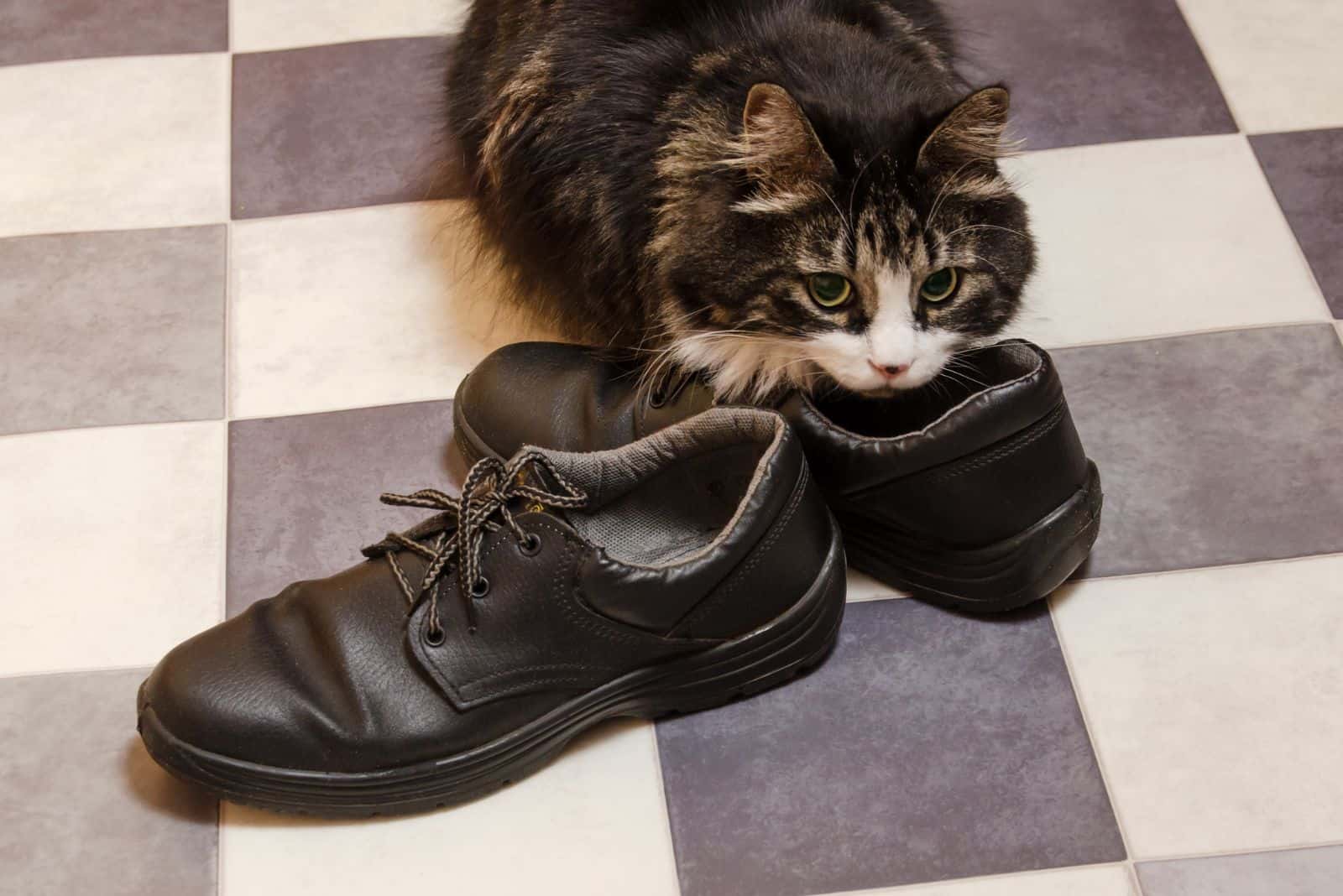
Indoor cats may urinate outside of their litter box as a response to stress or anxiety. Changes in routine, introducing a new cat or person, or moving to a new home could all be potential causes of a stressed cat.
7. Your Cat Might Be Suffering From An UTI Or A Bladder Infection
Feline UTI (urinary tract infection) is one of the most common causes of inappropriate urination in cats.
Symptoms of a UTI include urinating outside the litter box, increased frequency of urination (more frequent visits to the litter box), difficulty urinating, and bloody or cloudy urine.
8. Your Cat Might Have Kidney Disease
Cats with kidney disease may experience a change in their urinary habits, which can lead to inappropriate urination outside the litter box.
9. Your Cat Might Have Cognitive Dysfunction
Cognitive dysfunction, also known as feline cognitive decline or feline dementia, is a condition that affects older cats and is characterized by cognitive function and behavior changes.
Symptoms of cognitive dysfunction in cats may include changes in litter box habits (such as not using the litter box, or choosing some other site, such as shoes).
10. Your Cat Was Startled
A cat that is startled can pee outside the litter box.
If a cat is startled by a loud noise or sudden movement, it may become scared and instinctively urinate outside the litter box.
11. Your Cat Is In Unfamiliar Surroundings
Changes in the home environment, such as the addition of a new pet or person, or renovations to the home, can stress your cat and cause them to pee in your shoes.
If you have recently moved to a new home, your cat may feel stressed or disoriented and may pee in your shoes because of it.
12. Your Cat Is Protesting Against Something It Doesn’t Like
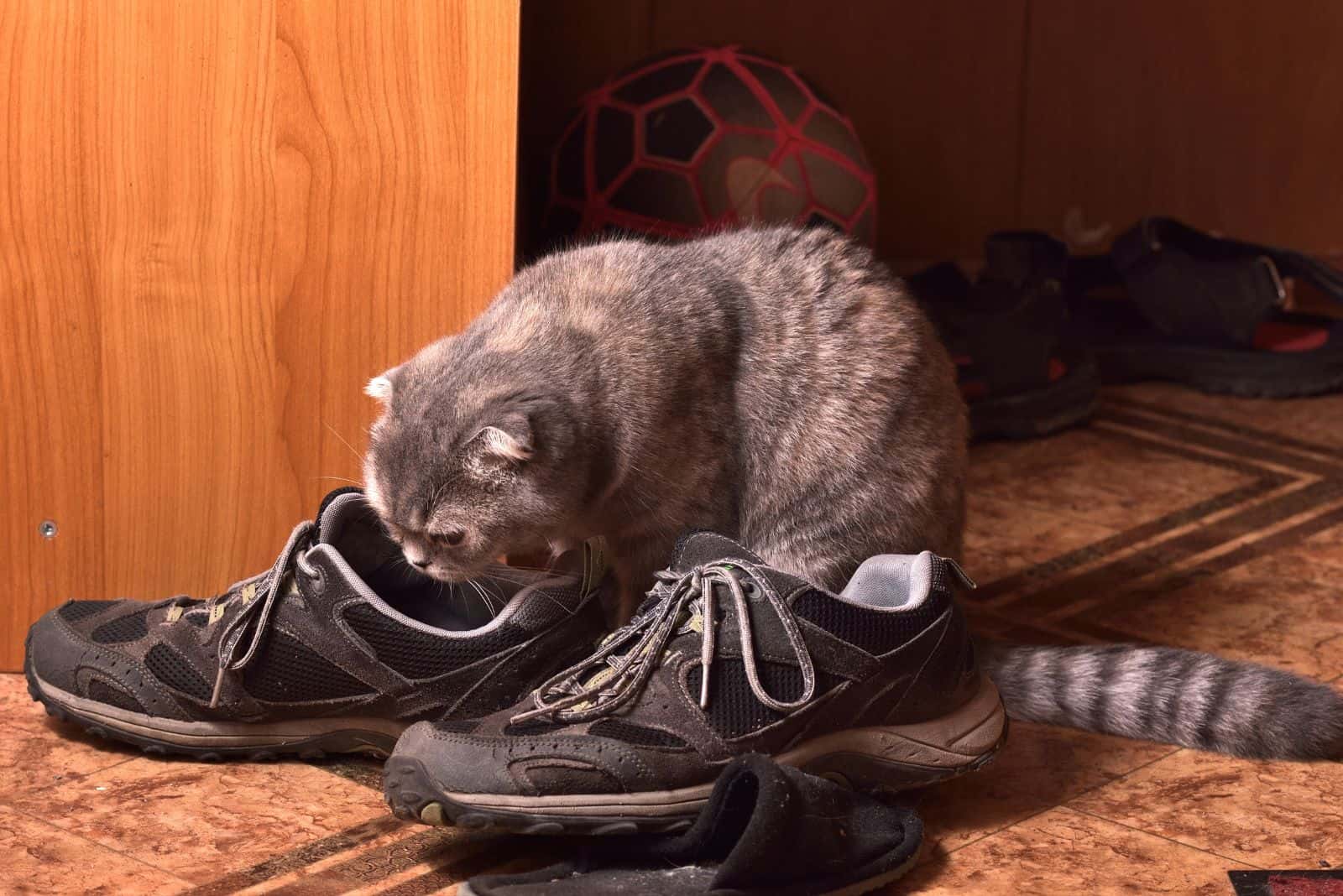
Your cat may be protesting something it doesn’t like by peeing outside the litter box.
Cats are very sensitive animals and may be protesting a change in their environment, a lack of attention from their owner, or even something as small as a new type of litter.
13. Your Cat Is Trying To Get Your Attention
Your cat may be trying to get your attention by urinating in your shoes. This could signify that they are feeling neglected or seeking more attention and affection from you.
14. Your Cat Is Trying To Tell You Something Is Wrong
Cats can exhibit various behaviors when trying to communicate something to their owners, and inappropriate urination is one of them.
Cats sometimes do this when they are stressed or anxious about something.
15. Your Cat Is Upset With You
Cats may show their unhappiness with something their owner did by hissing, avoiding their owner, and even peeing outside the litter box.
16. Your Cat Is Trying To Show Dominance Over You
Your cat may be trying to show dominance over you by peeing outside the litter box.
Sometimes, a cat might resort to this kind of behavior as they see themselves as the leader of the house.
17. Your Cat Is Threatened By A New Pet In The Home
If your cat feels threatened or is displaying aggressive behavior towards other pets in the home, they may pee in shoes to assert their dominance.
What Should I Do About My Cat Peeing In Shoes?
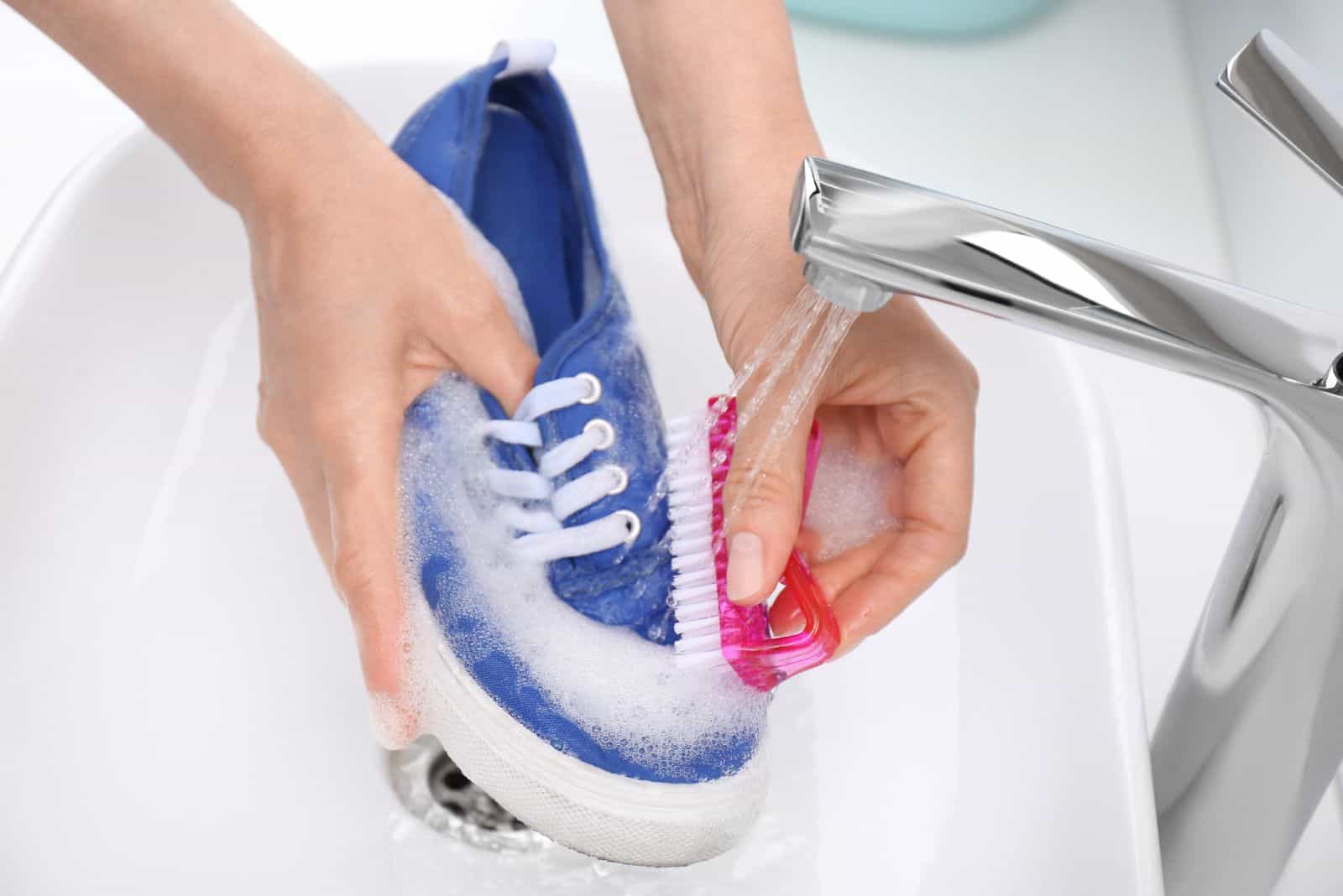
Step 1: Clean It
If your cat has peed in a shoe, cleaning up the mess as quickly as possible is important to prevent any odors from lingering.
Take the shoe outside as soon as you can, to prevent the smell from spreading throughout the house. Then, using a paper towel, absorb as much urine as possible.
After you’ve done this, mix water and some type of cleaning solution (you can also use white vinegar or baking soda) and clean the shoe.
Rinse the shoe thoroughly with clean water and allow it to air dry.
What About The Urine Smell?
The best way to eliminate cat urine smell is to thoroughly clean the area with a pet odor eliminator (odor remover) or enzymatic cleaner.
Enzyme cleaners are specifically designed to break down the molecules that cause the unpleasant smell of cat urine.
Scrubbing the area with hydrogen peroxide can help too. If that’s not working, try putting your shoes in the washing machine (if the shoes are made of such material that can withstand it).
I hope your shoes will not have a urine stain on them!
Step 2: Find Out What’s Causing It
If your cat is peeing in your shoes, it is essential to identify the underlying cause of this behavior and take steps to address it.
There could be various reasons for this behavior, including medical issues, stress, marking territory, or a preference for a different type of litter box.
It’s important to consult with a veterinarian to rule out any medical issues and to try to identify the underlying cause of your cat’s behavior.
They can help you develop a plan to address the problem and prevent your cat from peeing in your shoes.
Step 3: Stop Your Cat From Doing It Again
How? I’ll explain everything in the section below!
12 Ways To Stop Your Cat From Peeing In Your Shoes
1. Keep Shoes Out Of Reach
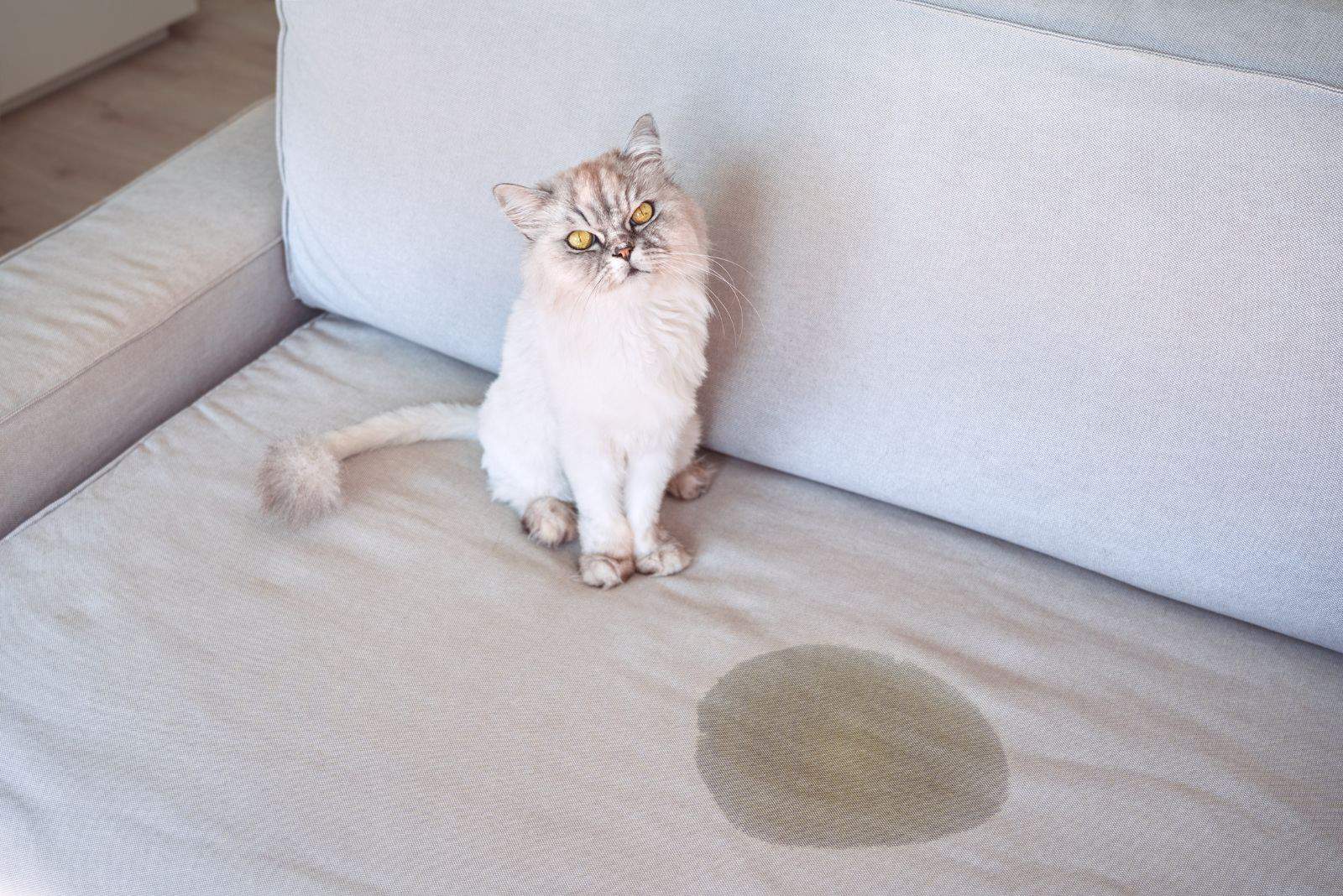
If your cat has access to shoes, it will be more likely to pee in them.
Keep your shoes in a shoe rack that is tall enough that your cat can’t reach them, or store your shoes in a storage box or bag that is out of reach of your cat.
However, this is only a short-term solution, as your cat might start peeing somewhere else in the home. In this case, you need to understand why your cat is not using its litter box properly.
2. Address Any Medical Issues
If your cat is peeing outside the litter box, it is essential to take them to the vet for a checkup.
Peeing outside the litter box could indicate a medical issue or an environmental one that needs to be addressed.
Your vet can provide a diagnosis and discuss the potential causes and solutions with you.
It is important to rule out any medical issues first since those can be treated more quickly and efficiently than behavioral issues.
3. Monitor Your Cat’s Behavior
Pay attention to your cat’s behavior and try to identify any patterns or triggers that may be causing the cat to pee in shoes (or any other inappropriate location).
Try to keep track of the time of day and potential environmental factors influencing the cat’s behavior.
If you identify what’s might be triggering your cat’s unwanted behavior, you can try to get rid of the trigger, and thereby get rid of your cat’s inappropriate elimination issue.
4. Reward Good Behavior
If you catch your cat using the litter box, give it praise and a small treat.
There are many ways to reward cats for good behavior, such as giving them treats, petting them, playing with them, or giving them extra attention!
This will reinforce the behavior and help your cat understand that using the litter box is rewarding.
5. Spay/ Neuter Your Cat
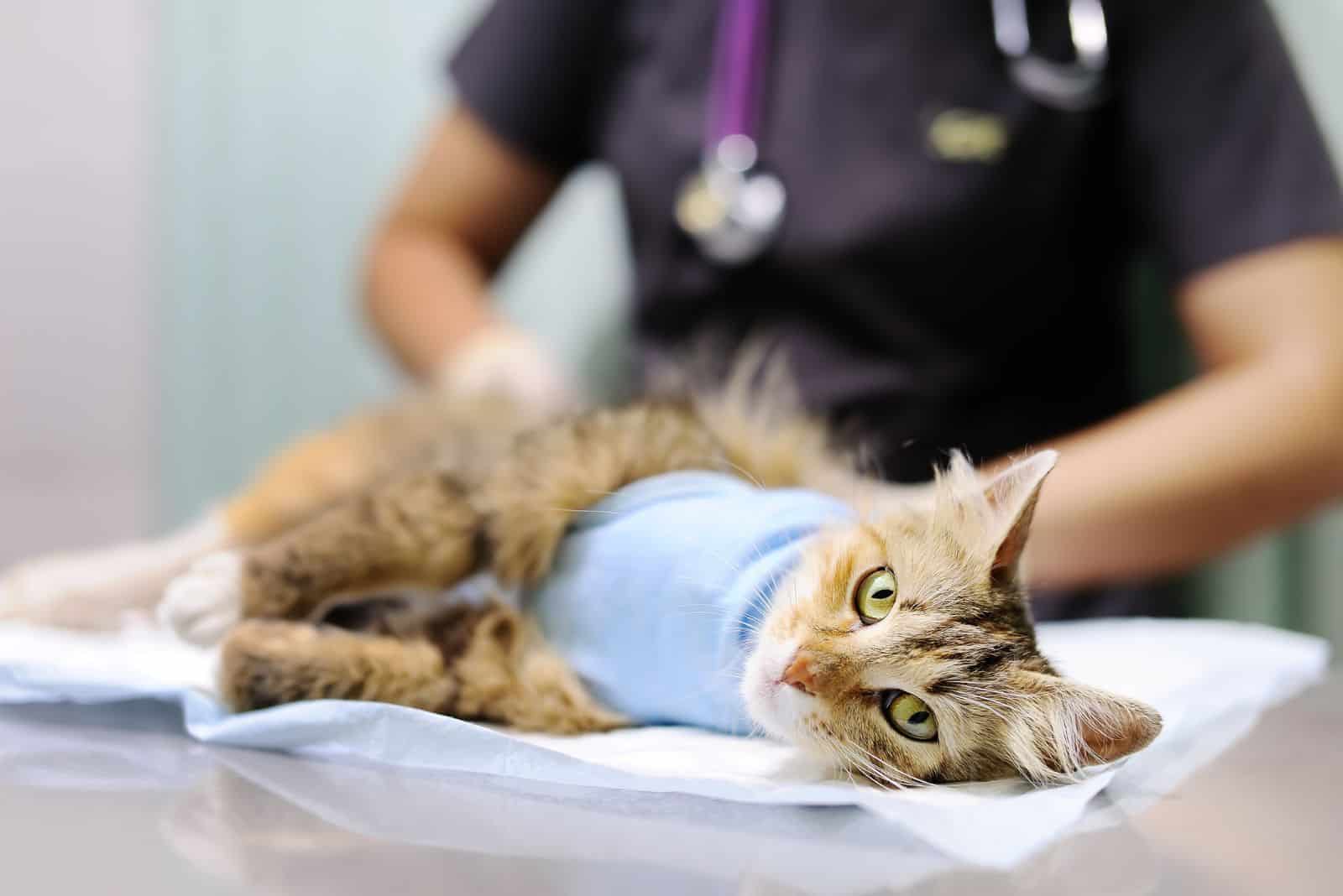
One way to stop your feline from peeing outside the litter box is to ensure your cat is spayed/neutered.
Un-neutered and unspayed cats are much more likely to mark their territory with urine.
Spaying/ neutering your cats will help keep your home cleaner and reduce unpleasant odors (we all can agree that cat urine odor is very unpleasant!).
6. Clean The Litter Box On Time
Make sure the litter box is cleaned regularly. Cats prefer a clean litter box and may avoid using an unclean one.
If the litter box is dirty, your cat will likely find another site in the home to use as a litter box (and you don’t want that!)
Cleaning your cat’s litter box on time is important for your cat’s health and the cleanliness of your home.
7. Switch To Another Litter Box Or Liter Type
Start by slowly introducing your cat to the new litter box by placing it in the same area as the old one. Allow your cat to explore the new box and get used to it.
Some cats prefer certain types of litter, so experiment to see what your cat likes best. Luckily, there are many different types of cat litters in the market, so I’m sure you’ll have no issue finding the one that suits your feline best!
8. Have Multiple Litter Boxes In Your Home
It’s important to have one litter box for each cat, plus one extra.
Multiple litter boxes in the home create more space for cats to relieve themselves, and it can reduce the competition between cats over access to the litter box in a household with multiple cats.
9. Place A Litter Box In The Area Where Your Cat Is Peeing
Placing a litter box in the area where your cat is peeing will help your cat stop peeing in shoes.
Cats may become stressed or anxious for various reasons and display inappropriate elimination behavior, such as peeing in shoes.
Providing a litter box where the cat is peeing may help alleviate the cat’s stress and make it feel more comfortable eliminating in the appropriate place (the litter box).
10. Try Using A Deterrent Spray
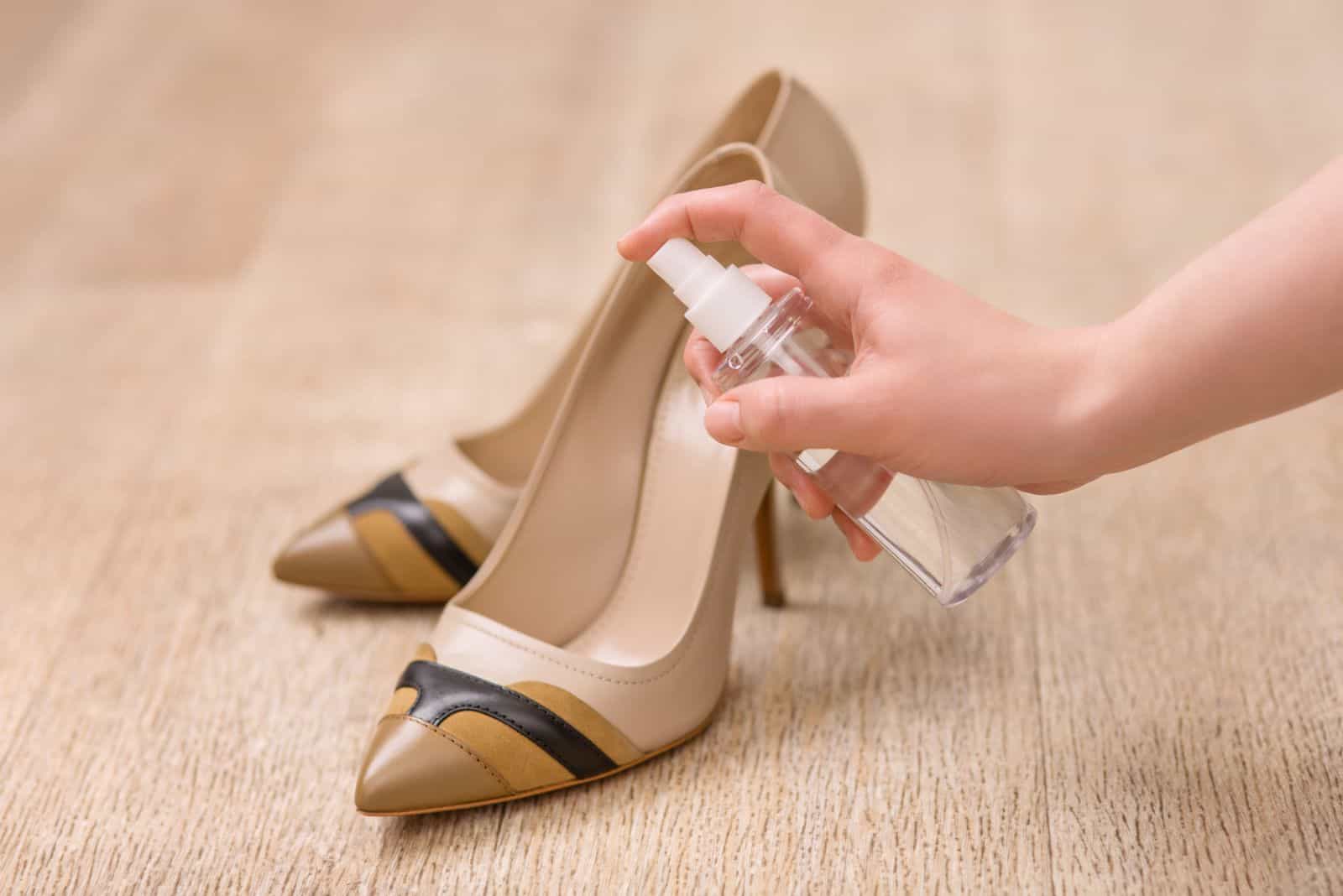
Spraying the area (shoes) with a pet-safe deterrent spray can help prevent your cat from peeing repeatedly in the same spot.
Many deterrent sprays’ active ingredients are either natural or synthetic compounds that are generally considered safe when used as directed.
You can even put a strong-smelling deterrent near your shoes, such as citrus peels, to prevent your cat from getting close to them. Cats hate the smell of citrus fruits.
11. Using A Pheromone Diffuser Might Be A Good Option
Pheromone diffusers use synthetic versions of the same pheromones that cats naturally produce.
These pheromones are believed to have calming and reassuring properties for cats and can help reduce stress and anxiety in those who feel anxious or fearful.
When a cat smells the synthetic pheromone diffused in the air, it can help to reduce its stress and make them more relaxed in their home environment.
Suggested: Comfort Zone Vs Feliway: Which Pheromone Diffuser Is Better?
12. Provide Your Cat With Plenty Of Playtime
Some cats pee in shoes to get their owner’s attention. If that’s the case for your kitty, you should spend quality time with your cat.
Devote some of your time to petting or brushing your cat, and try to give it lots of love and attention. This will help strengthen the bond between you and your furry friend!
Make a daily routine for playtime. Set aside 10-15 minutes daily to engage with your cat!
What Should You Do If The Unwanted Behavior Persists?
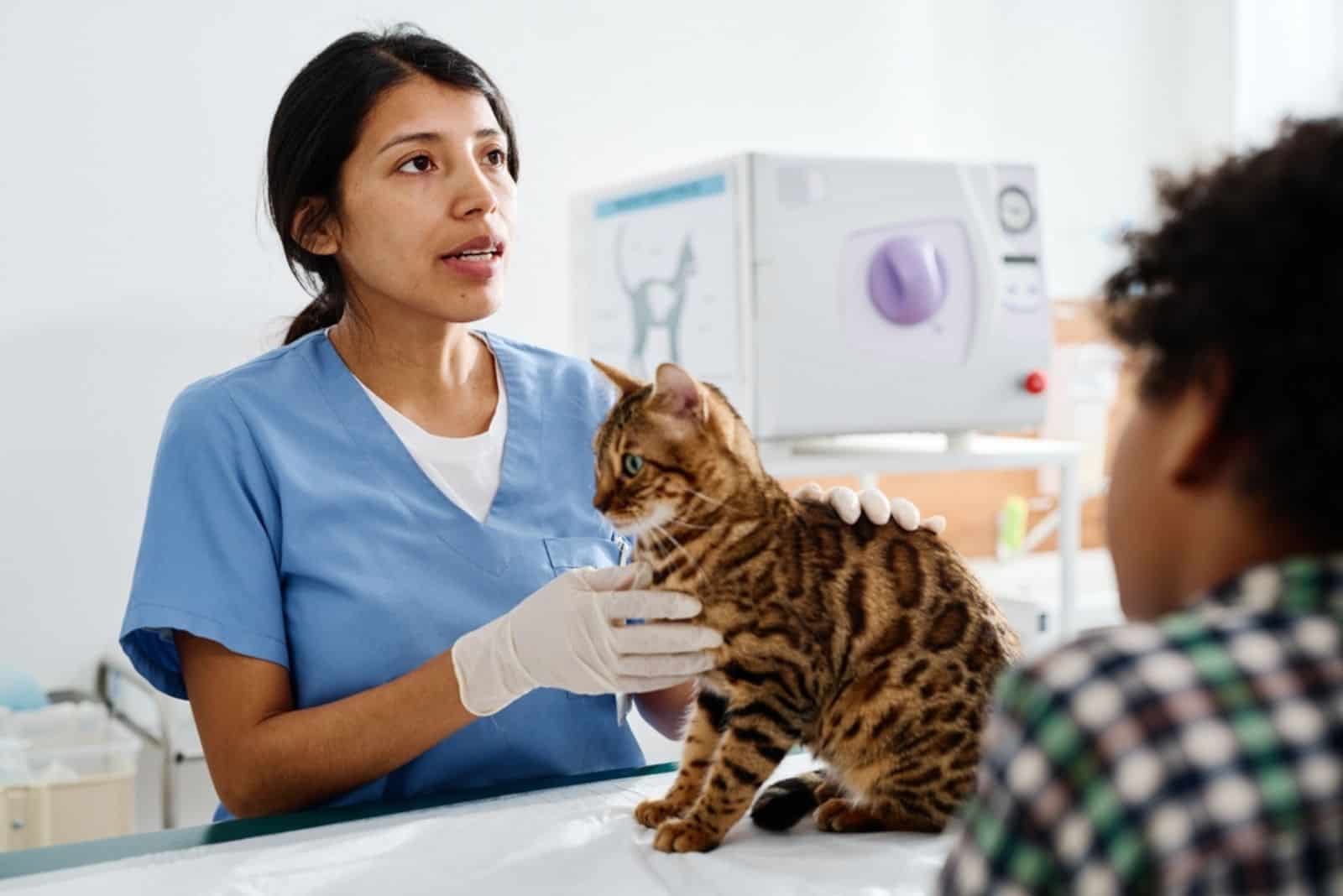
Suppose these tips are not helping, and your cat continues to pee in your shoes.
In that case, consulting a veterinarian or a certified animal behaviorist may be helpful for more specific advice.
How Can A Vet Help?
A vet could help you by identifying potential underlying medical conditions causing the behavior, and provide treatment options.
Often, the underlying medical problems are feline urinary tract infection (UTI) or kidney disease.
Feline UTI and kidney disease need to be treated by a veterinarian. The earlier the diagnosis is made, the better the prognosis.
Treatment may involve antibiotics, dietary changes, and possibly other medications.
How Can An Animal Behavior Specialist Help?
A certified animal behaviorist can help you determine the underlying cause of your cat’s problematic behavior (peeing in shoes) and develop a plan for addressing it.
The behaviorist may suggest behavior modification techniques, such as positive reinforcement, to help your cat learn to properly use the litter box and stop peeing outside of it.
In Conclusion
A cat peeing in shoes can be a sign of a medical issue such as a urinary tract infection, diabetes, or kidney disease.
It could also be a sign of stress or anxiety, or it could be due to a simple issue such as not having a clean litter box around.
If you think your cat may have a medical issue, it’s important to take them to the vet for a checkup. If the issue is behavioral, try to identify the source of the stress and work on reducing it.
Cat owners, whatever the cause might be, I’m sure your kitty will be okay, and I hope you’ll solve this issue quickly!
Learn how to deal with other similar unwanted feline behaviors:
• Cat Peeing Over Edge Of Litter Box: 13 Reasons & Solutions
• 7 Reasons Why My Cat Is Peeing On Furniture + Prevention Tips!

